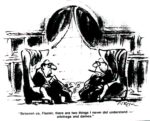This paper shows how to find competitive market prices in the pure mathematics of classical constrained optimization problems.
Alleged Problems in Labor-Managed Firms
This paper will discuss two problems that have plagued the literature on the Ward-Domar-Vanek labor-managed firm (LMF) model, the perverse supply response problem and the Furubotn-Pejovich horizon problem.
Panopticon vs. McGregor’s Theory Y
This paper is part of a larger project to better understand the limitations of the economic theory of agency and incentives. The economic approach focuses on extrinsic incentives whereas a better understanding of human organization requires an understanding of intrinsic motivation and the complementary or substitutive relationships with extrinsic motivation.
Labor theory of property and predistribution
This is the online-first publication in Challenge: The Magazine of Economic Affairs of an article on the labor theory of property showing the superficiality of the inequality-debate framing in terms of distribution (i.e., how much is distributed by a firm to labor versus capital) in favor of a framing in terms of what is now called “predistribution”–in this case the question of who is to be the firm in the first place, Capital or Labor.
Reply to Commentators on Labor Theory of Property
My paper on marginal productivity theory and the labor theory of property in the on-line journal Economic Thought drew commentaries for Jamie Morgan and Ted Burczak. After some back and forth on the journal’s discussion forum, this Reply to Commentators paper was published as an article in the journal.
Classical Liberalism and the Firm
This is a scan of my chapter in the new book: Commerce and Community: Ecologies of Social Cooperation, edited by Robert F. Garnett, Paul Lewis, and Lenore T. Ealy. London: Routledge, 2015.
On Property Theory
This paper is an introduction to property theory including the invisible hand mechanism which handles the initiation and termination of property rights in an on-going private property market economy. The Fundamental Theorem is that when Hume’s conditions of no involuntary transfers and no breached contracts are fulfilled, then the Lockean principle of people getting the fruits of their labor, i.e., imputing legal responsibility in accordance with de facto responsibility is satisfied. The major application is to the current system of a private property market economy based on the renting of persons, i.e., the employment contract.
This is a reprint of the paper in the Journal of Economic Issues in Sept. 2014.
Property and Contract in Economics: The Case for Economic Democracy
This book presents a modern version of the old Labor (or Natural Rights) Theory of Property and of an Inalienable Rights Theory that descends from the Reformation and Enlightenment. Together these theories re-solve the basic problem of distribution in the sense of giving a basis for the just appropriation of property and a basis for answering the question of who is to be the firm, e.g., the suppliers of share capital as in conventional capital, the government as in socialism, or the people who work in the firm as in the system of economic democracy (or labor-managed market economies).
Numeraire Illusion: The Final Demise of the Kaldor-Hicks Principle
The result in this paper undercuts the major applications of the Kaldor-Hicks reasoning in the standard Chicago school (wealth maximization) of law and economics, cost–benefit analysis, policy analysis, and related parts of applied welfare economics.




